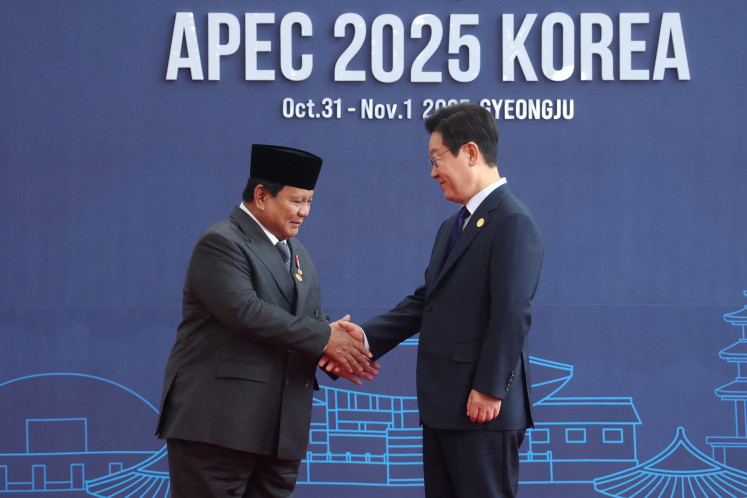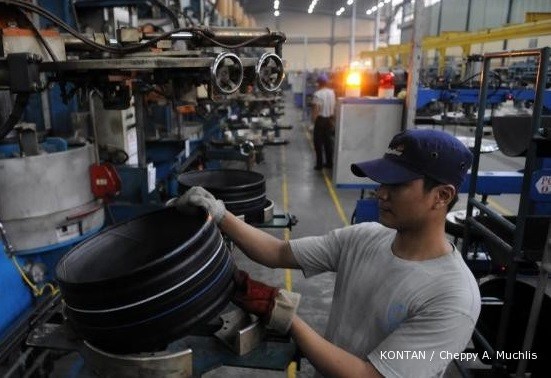Popular Reads
Top Results
Can't find what you're looking for?
View all search resultsPopular Reads
Top Results
Can't find what you're looking for?
View all search resultsExperts defend 'kampung' for making Jakarta unique, diverse
A number of urban planners and social activists have defended the existence of the cityâs kampung, often considered to be slums and accused of being illegal settlements, as they maintain the uniqueness and diversity of Jakarta
Change text size
Gift Premium Articles
to Anyone
A
number of urban planners and social activists have defended the existence of the city's kampung, often considered to be slums and accused of being illegal settlements, as they maintain the uniqueness and diversity of Jakarta.
The experts and the activists recently gathered for a seminar entitled 'Building our urban villages together' to propose an urban model that invests more in the numerous city kampung.
Urban-poor activist and Ciliwung Merdeka community leader Sandyawan Sumardi said that despite the negative labels attached to kampung, they are important because they have unique characteristics in their architecture, histories and cultures.
'If there are 1,000 kampung in one city, I assure you there will be 1,000 different facets and spirits,' he said in the seminar.
According to Sandyawan, labeling kampung as slums dated back to the colonial period when the Dutch administration distinguished settlements for ordinary citizens (indlandshe gemeente) from settlements for aristocrats (stads gemeente). The label has endured until today even after the formal separation ended.
He said all the negative labels against kampung were unfair because they do not consider their roles and their social and economic potential.
Urban kampung, for example, became the places where the majority of the city's residents live. Sandyawan said 70 to 80 percent of residents in big Indonesian cities, including Jakarta, live in urban kampung.
'Meanwhile, governmental and private housing can only fulfill 15 percent of the total residential need in big cities in Indonesia,' he said.
Urban kampung have also become the places where residents conduct economic activities. He said 80 percent of residents in kampung use their houses to run businesses.
He said that kampung also provide homes and shelters for the urban poor. 'The ability for the poor to survive in the city depends heavily on whether urban kampung can protect them.'
Jo Santoso, an urban planner and the head of the Planology Master Study Program at Tarumanagara University (Untar), said that urban kampung in Jakarta were abandoned because the city administration failed to involve its citizens in planning the city.
He said Jakarta now has become part of a global economic system that exists to serve the interests of business groups rather than the majority of citizens living in urban kampung.
Jo said an ideal city should be designed according to what the majority of its citizens want their city to be like.
He also blamed the Indonesian land distribution system, which is based on who can pay a higher price, rather than on social benefits and functions, as one reason why residents were often evicted from urban kampung.
He said the system violated the principles stipulated in the 1945 Constitution, which favored social benefit over private control, as well as the agrarian laws in which land distribution is to be made in the spirit of social benefit.
Article 6 of Agrarian Law No. 5/1960 stipulates that all land ownership should bring a social benefit.
The principle of social benefit in the agrarian law should be incorporated into the land distribution system to make Jakarta an ideal human settlement, Jo said.
He said if the administration was committed to making the city a humane place, forced evictions like what took place at Kebon Melati in Central Jakarta and Kampung Pulo in East Jakarta would have not
happened.
Kampung Pulo and Kebon Melati were two kampung occupying the banks of the Melati Reservoir and the Ciliwung River, respectively.
The city administration said it demolished hundreds of buildings on the reservoir's and the river's banks because they were in the way of the city's and the central government's flood mitigation program. (saf)










